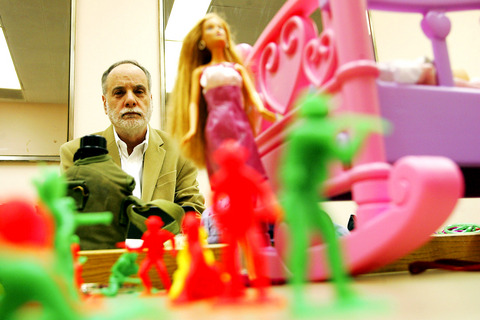Until recently, many children who did not conform to gender norms in their clothing or behavior had been subjected to psychoanalysis and behavior modification.
But as advocates gain ground for what they call gender-identity rights, evidenced most recently by New York City's decision to let people alter the sex listed on their birth certificates, a major change is taking place among schools and families. Children as young as five who display predispositions to dress like the opposite sex are being supported in their choice by a growing number of young parents, educators and mental health professionals.
Doctors, some of them from the top pediatric hospitals, have begun to advise families to let these children be "who they are" to foster a sense of security and self-esteem. They are motivated, in part, by the high incidence of depression, suicidal feelings and self-mutilation that has been common in past generations of transgender children. Legal trends suggest that schools are now required to respect parents' decisions.

PHOTOS: NY TIMES NEWS SERVICE
Cassandra Reese, a first-grade teacher outside Boston, recalled that fellow teachers were unnerved when a first-grade boy showed up in a skirt. "They said 'this is not normal' and 'it's the parents' fault,"' Reese said. "They didn't see children as sophisticated enough to verbalize their feelings."
As these children head into adolescence, some parents are even choosing to medically block puberty to buy time for them to figure out who they are.
While these children are still relatively rare, child health professionals say the number of referrals is rising across the nation. Massachusetts, Minnesota, California, New Jersey and the District of Columbia have laws explicitly protecting the rights of transgender students, and some schools are engaged in a steep learning curve to dismantle gender stereotypes.

Massachusetts, Minnesota, California, New Jersey and the District of Columbia have laws explicitly protecting the rights of transgender students, and some schools are engaged in a steep learning curve to dismantle gender stereotypes.
The prospect of cross-dressing kindergartners has sparked a deep philosophical divide among professionals over how best to counsel families.
Is it healthier for families and schools to follow the child's lead, or to spare children potential humiliation and isolation by steering them toward accepting their biological gender until they are older?
Both sides in the debate underscore their concern for the profound vulnerability of such youngsters, symbolized by occurrences like the brutal murder in Newark, California, in 2002 of Gwen Araujo, a transgender teenager born as Eddie.
"Parents now are looking for advice on how to make life reasonable for their kids — whether to allow cross-dressing in public, and how to protect them from the savagery of other children," said Herbert Schreier, a psychiatrist with Children's Hospital and Research Center in Oakland.
But Kenneth Zucker, a psychologist and head of the gender-identity service at the Center for Addiction and Mental Health in Toronto, disagrees with the "free to be" approach.
Over the past 30 years, Zucker has treated about 500 preadolescent children who were gender variant. In his studies, 80 percent of the children between three and 12 grow out of the behavior, but 15 percent to 20 percent continue to be distressed about their gender and may ultimately change their sex.
Zucker said his goal was to "help these kids be more content in their biological gender" until they are older and can determine their sexual identity.
One of the most controversial issues concerns the use of "blockers," hormones used to delay the onset of puberty in cases where it could be psychologically devastating (for instance, a girl who identifies as a boy might slice her wrists when she gets her period). Some doctors disapprove of blockers, arguing that only at puberty does an individual fully appreciate their gender identity.
Catherine Tuerk, a nurse-psychotherapist at the children's hospital in Washington and the mother of a gender-variant child in the 1970s, says parents are still left to find their own way. She recalls how therapists urged her to steer her son into psychoanalysis and "hypermasculine activities" like karate. She said she and her husband became "gender cops."
"It was always 'you're not kicking the ball hard enough,"' she said.
Tuerk's son, now 30, is gay and has two children, and her own thinking has evolved since she was a young parent. "People are beginning to understand this seems to be something that happens," she said. "But there was a whole lifetime of feeling we could never leave him alone."

Most heroes are remembered for the battles they fought. Taiwan’s Black Bat Squadron is remembered for flying into Chinese airspace 838 times between 1953 and 1967, and for the 148 men whose sacrifice bought the intelligence that kept Taiwan secure. Two-thirds of the squadron died carrying out missions most people wouldn’t learn about for another 40 years. The squadron lost 15 aircraft and 148 crew members over those 14 years, making it the deadliest unit in Taiwan’s military history by casualty rate. They flew at night, often at low altitudes, straight into some of the most heavily defended airspace in Asia.

This month the government ordered a one-year block of Xiaohongshu (小紅書) or Rednote, a Chinese social media platform with more than 3 million users in Taiwan. The government pointed to widespread fraud activity on the platform, along with cybersecurity failures. Officials said that they had reached out to the company and asked it to change. However, they received no response. The pro-China parties, the Chinese Nationalist Party (KMT) and Taiwan People’s Party (TPP), immediately swung into action, denouncing the ban as an attack on free speech. This “free speech” claim was then echoed by the People’s Republic of China (PRC),

Many people in Taiwan first learned about universal basic income (UBI) — the idea that the government should provide regular, no-strings-attached payments to each citizen — in 2019. While seeking the Democratic nomination for the 2020 US presidential election, Andrew Yang, a politician of Taiwanese descent, said that, if elected, he’d institute a UBI of US$1,000 per month to “get the economic boot off of people’s throats, allowing them to lift their heads up, breathe, and get excited for the future.” His campaign petered out, but the concept of UBI hasn’t gone away. Throughout the industrialized world, there are fears that

Like much in the world today, theater has experienced major disruptions over the six years since COVID-19. The pandemic, the war in Ukraine and social media have created a new normal of geopolitical and information uncertainty, and the performing arts are not immune to these effects. “Ten years ago people wanted to come to the theater to engage with important issues, but now the Internet allows them to engage with those issues powerfully and immediately,” said Faith Tan, programming director of the Esplanade in Singapore, speaking last week in Japan. “One reaction to unpredictability has been a renewed emphasis on